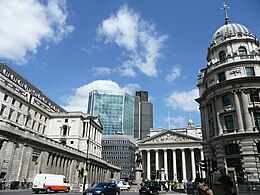This article needs to be updated. (October 2023) |

The London Inter-Bank Offered Rate (Libor /ˈlaɪbɔːr/ LY-bor)[a] was an interest rate average calculated from estimates submitted by the leading banks in London. Each bank estimated what it would be charged were it to borrow from other banks.[1][b] It was the primary benchmark, along with the Euribor, for short-term interest rates around the world.[2][3] Libor was phased out at the end of 2021, with market participants encouraged to transition to risk-free interest rates such as SOFR and SARON.[4][5][6]
LIBOR was discontinued in the summer of 2023. The last rates were published on 30 June 2023 before 12:00 pm UK time. The 1 month, 3 month, 6 month, and 12 month Secured Overnight Financing Rate (SOFR) is its replacement.[7][8][9] In July 2023, the International Organization of Securities Commissions (IOSCO) said four unnamed dollar-denominated alternatives to LIBOR, known as "credit-sensitive rates", had "varying degrees of vulnerability" that might appear during times of market stress.[10]
Libor rates were calculated for five currencies and seven borrowing periods, ranging from overnight to one year, and were published each business day by Thomson Reuters.[11] Many financial institutions, mortgage lenders, and credit card agencies set their own rates relative to it. At least $350 trillion in derivatives and other financial products were tied to Libor.[12]
In June 2012, multiple criminal settlements by Barclays Bank revealed significant fraud and collusion by member banks connected to the rate submissions, leading to the Libor scandal.[13][14][15] The British Bankers' Association said on 25 September 2012 that it would transfer oversight of Libor to UK regulators, as proposed by Financial Services Authority managing director Martin Wheatley's independent review recommendations.[16] Wheatley's review recommended that banks submitting rates to Libor must base them on actual inter-bank deposit market transactions and keep records of those transactions, that individual banks' Libor submissions be published after three months, and recommended criminal sanctions specifically for manipulation of benchmark interest rates.[17] Financial institution customers may experience higher and more volatile borrowing and hedging costs after implementation of the recommended reforms.[18] The UK government agreed to accept all of the Wheatley Review's recommendations and press for legislation implementing them.[19]
Significant reforms, in line with the Wheatley Review, came into effect in 2013 and a new administrator took over in early 2014.[20][21] The British government regulated Libor through criminal and regulatory laws passed by Parliament.[22][23] In particular, the Financial Services Act 2012 brought Libor under UK regulatory oversight and created a criminal offence for knowingly or deliberately making false or misleading statements relating to benchmark-setting.[20][24]
Cite error: There are <ref group=lower-alpha> tags or {{efn}} templates on this page, but the references will not show without a {{reflist|group=lower-alpha}} template or {{notelist}} template (see the help page).
- ^ Q&A: what is Libor and what did Barclays do to it? Archived 30 October 2014 at Wikiwix – CityWire 29 June 2012 at 17:05.
- ^ Zibel, Alan (30 September 2008). "Q&A: What is Libor, and how does it affect you?". The Seattle Times. Archived from the original on 11 July 2012.
- ^ "Barclays fined for attempts to manipulate key bank rates". BBC News. 27 June 2012. Archived from the original on 27 June 2012. Retrieved 27 June 2012.
- ^ "The future of LIBOR". UK Financial Conduct Authority (FCA). 26 July 2017. Retrieved 16 July 2019.
- ^ "LIBOR: preparing for the end". UK Financial Conduct Authority (FCA). 15 July 2019. Retrieved 16 July 2019.
- ^ "Transition from LIBOR to risk-free rates". Bank of England.
- ^ Miranda Marquit; Benjamin Curry (6 September 2022). "What Is Libor And Why Is It Being Abandoned?". Retrieved 23 October 2022.
- ^ The LIBOR index for adjustable-rate loans is being discontinued, 7 December 2021,
The United Kingdom financial regulator that oversees LIBOR has announced that they'll discontinue the index by June 2023.
- ^ Mccrank, John; Chavez-Dreyfuss, Gertrude (30 June 2023). "As the Libor era ends, market participants hope for 'crickets'". Reuters. Retrieved 30 June 2023.
- ^ Jones, Huw (3 July 2023). "Curb use of dollar Libor alternatives to Fed rate, says watchdog". Reuters. Retrieved 3 July 2023.
- ^ "ICE Benchmark Administration (IBA) ICE LIBOR". IntercontinentalExchange. Archived from the original on 2 April 2015. Retrieved 6 April 2015.
- ^ "Behind the Libor Scandal". The New York Times. 10 July 2012. Archived from the original on 12 July 2012.
- ^ Cite error: The named reference
cftcwas invoked but never defined (see the help page). - ^ Cite error: The named reference
usdojwas invoked but never defined (see the help page). - ^ Cite error: The named reference
fsawas invoked but never defined (see the help page). - ^ Cite error: The named reference
BloombergMainwas invoked but never defined (see the help page). - ^ Cite error: The named reference
Blakeswas invoked but never defined (see the help page). - ^ Cite error: The named reference
Brettellwas invoked but never defined (see the help page). - ^ Ainsley Thomson (17 October 2012) "UK Treasury Minister: Government Accepts Recommendations Of Wheatley Libor Review In Full"[permanent dead link] Dow Jones Newswires / Fox Business
- ^ a b Anthony Browne, chief executive of the British Bankers' Association (11 July 2013). "Libor now has a new administrator – but our reforms have gone much further". City A.M. Archived from the original on 4 November 2013. Retrieved 20 July 2013.
- ^ "BBA Libor Benchmark Administrator's News". The British Bankers' Association. Archived from the original on 22 June 2013. Retrieved 25 July 2013.
- ^ "UK Government Policy: Creating stronger and safer banks". UK Government. 17 July 2013. Archived from the original on 17 October 2013. Retrieved 21 July 2013.
- ^ "UK Parliament General Committee Debates". UK Parliament. 27 February 2013. Archived from the original on 7 July 2013. Retrieved 22 July 2013.
- ^ "Financial Services Bill receives Royal Assent" (Press release). UK Government. 19 December 2012. Archived from the original on 13 January 2014. Retrieved 27 July 2013.